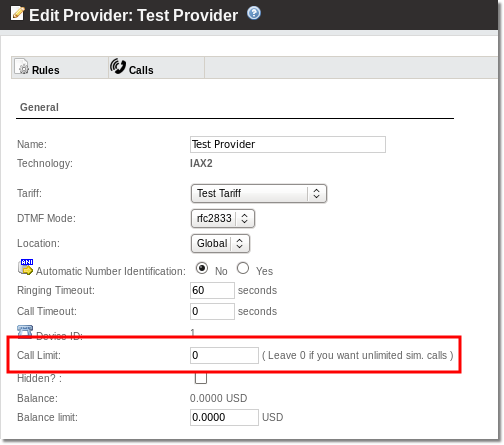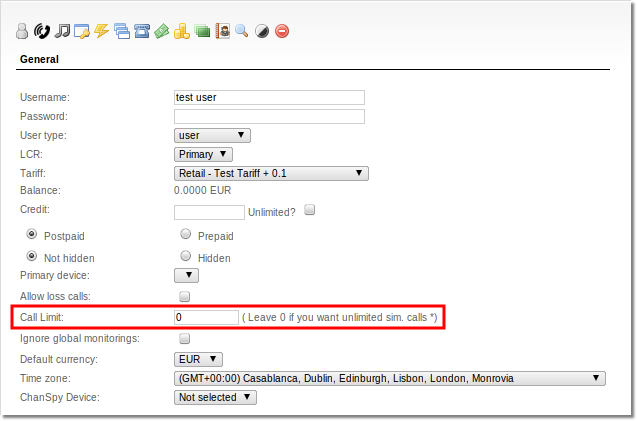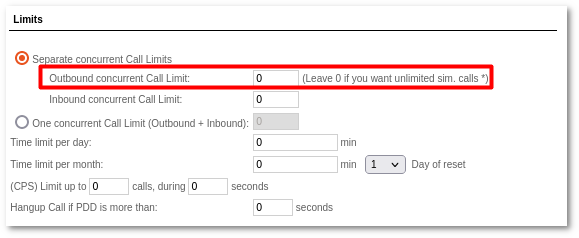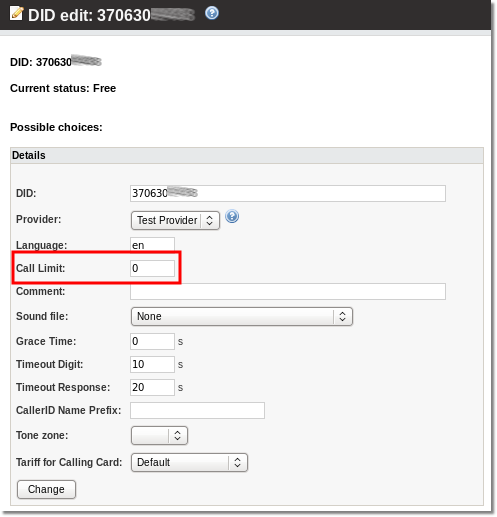Difference between revisions of "Simultaneous call limitation"
(→About) |
|||
| Line 5: | Line 5: | ||
These settings limit '''simultaneous calls''', not how many total calls the user/device/provider(/did) can make. | These settings limit '''simultaneous calls''', not how many total calls the user/device/provider(/did) can make. | ||
When no more calls can be made, the dialer hears the BUSY signal | When no more calls can be made, the dialer hears the BUSY signal. | ||
== Provider == | == Provider == | ||
<br><br> | |||
[[Image:prov.png]] | [[Image:prov.png]] | ||
<br><br> | |||
Call limit - describes how many simultaneous calls the provider can '''make'''. 0 (zero) means that calls are unlimited. | Call limit - describes how many simultaneous calls the provider can '''make'''. 0 (zero) means that calls are unlimited. | ||
| Line 19: | Line 20: | ||
== User == | == User == | ||
<br><br> | |||
[[Image:MOR 0.8.png]] | [[Image:MOR 0.8.png]] | ||
<br><br> | |||
Call limit - describes how many simultaneous calls the user can '''make'''. 0 (zero) means that calls are unlimited. | Call limit - describes how many simultaneous calls the user can '''make'''. 0 (zero) means that calls are unlimited. | ||
| Line 31: | Line 32: | ||
== Device == | == Device == | ||
<br><br> | |||
[[Image:devlimit.png]] | [[Image:devlimit.png]] | ||
<br><br> | |||
Call limit - describes how many simultaneous calls the device can '''make'''. 0 (zero) means that calls are unlimited. | Call limit - describes how many simultaneous calls the device can '''make'''. 0 (zero) means that calls are unlimited. | ||
| Line 44: | Line 46: | ||
== DID == | == DID == | ||
<br><br> | |||
[[Image: Didlim.png]] | [[Image: Didlim.png]] | ||
<br><br> | |||
Call limit - describes how many simultaneous calls DID can '''receive'''. 0 (zero) means that calls are unlimited. | Call limit - describes how many simultaneous calls DID can '''receive'''. 0 (zero) means that calls are unlimited. | ||
Revision as of 14:11, 15 January 2013
About
It is possible to limit simultaneous calls per provider/DID/user/device basis.
These settings limit simultaneous calls, not how many total calls the user/device/provider(/did) can make.
When no more calls can be made, the dialer hears the BUSY signal.
Provider

Call limit - describes how many simultaneous calls the provider can make. 0 (zero) means that calls are unlimited.
Hangupcause code 223 means that the provider can't make more simultaneous calls.
This limit is for outgoing calls through this provider.
User

Call limit - describes how many simultaneous calls the user can make. 0 (zero) means that calls are unlimited.
Hangupcause code 220 means that the user can't make more simultaneous calls.
Hangupcause code 222 means that a reseller (as a user) can't handle (allow to his users to make) more simultaneous calls.
This limit is for outgoing calls made by this user.
Device

Call limit - describes how many simultaneous calls the device can make. 0 (zero) means that calls are unlimited.
Hangupcause code 221 means that the device can't make more simultaneous calls.
This limit is for outgoing calls made by this device.
NOTE: MOR uses internal call limiting engine, so call limit which is shown in "sip show peer" output, has no relation to the Call Limit in the MOR GUI.
DID

Call limit - describes how many simultaneous calls DID can receive. 0 (zero) means that calls are unlimited.
Hangupcause code 219 means that DID can't receive more simultaneous calls.
This limit is for incoming calls made to this DID.
Special case
When DID points to a device and the limit is reached, calls will be routed to the device via BUSY - Call Flow. This will ring another device or send a call to VoiceMail when the main device already has a call.
